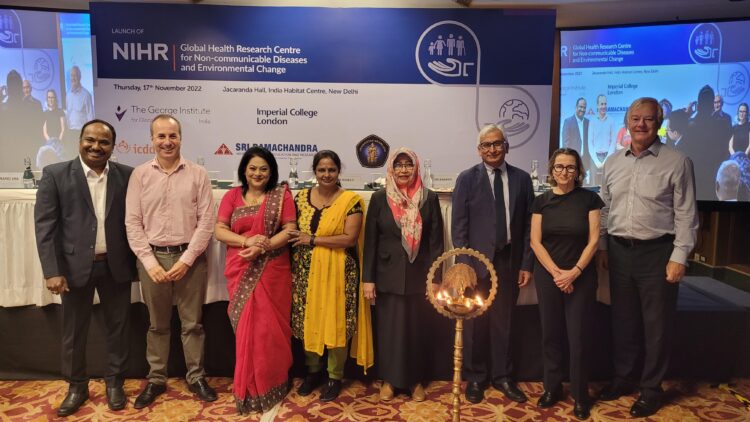With climate change ravaging the world and the likelihood of major outbreaks increasing, The George Institute for Global Health in India has announced the establishment of a new center to combat noncommunicable diseases and environmental changes. The Centre will work to address the dual challenge, with a focus on low- and middle-income countries.
In collaboration with Imperial College London, the George Institute for Global Health announced the establishment of the NIHR Global Health Research Centre on Noncommunicable Diseases and Environmental Change.
The National Institute for Health and Care Research gave presentations at the launch event on November 17 in New Delhi (NIHR). The Centre aims to address the dual challenges of a rapidly growing noncommunicable disease (NCD) burden and the threat of global environmental change in Low and Middle Income Countries (LMICs).
Aside from presentations, the session included multisectoral panel discussions and NIHR policy discussions, which brought together researchers, funders, community representatives, public health practitioners, policymakers, and thought leaders to introduce the Centre’s mission.
The National Institute for Health and Care Research (NIHR) funded the Centre with a £10 million grant.
Professor Vivekanand Jha, co-director of the Centre and Executive Director of The George Institute for Global Health in India, discussed the challenges faced by LMICs and how the Centre will work to generate “actionable evidence” to help improve the situation.
“LMICs face dual, intertwined challenges of a rapidly growing burden of NCDs and the existential threat of global environmental change. Our Centre will focus on three major challenges at the interface of NCDs and environmental change – air pollution, water salinity and food systems and generate actionable evidence for improving health outcomes and reducing inequities in a cost-effective manner,” he said.
According to Professor Christopher Millett, co-lead of the Centre and Professor of Public Health at Imperial College London, the Centre will enable participating institutions to build their capacity to deliver the high-quality, multi-disciplinary research that policymakers and communities require to reduce the impact of climate change on health in our focus countries and beyond.
LMICs face unique challenges in providing equitable, high-quality primary care services for the prevention and treatment of noncommunicable diseases (NCDs) such as diabetes, kidney disease, hypertension, and cardiovascular disease, as well as mental health.
Professor Faith Osier, Chair of the NIHR Global Health Research Centres funding committee, added that the mission is “groundbreaking” because it is the first time this level of investment has been made in noncommunicable disease research in low- and middle-income countries.
Over the next five years, the Centre will address the critical need to increase research capacity in order to identify effective strategies and interventions in local communities. Activities will be held for researchers at various stages of their careers, as well as for institutions and the larger community.
An interdisciplinary group of academics from the International Centre for Diarrhoeal Research (Bangladesh), Sri Ramachandra Institute of Higher Education & Research (India), and the University of Brawijaya (Indonesia) will work to address NCDs and environmental change at the NIHR Global Health Research Centre for NCDs and Environmental Change who will work to address specific health concerns related to environmental change.
Source:IT







 Finance
Finance







